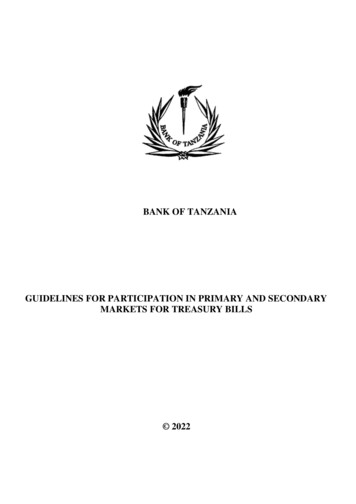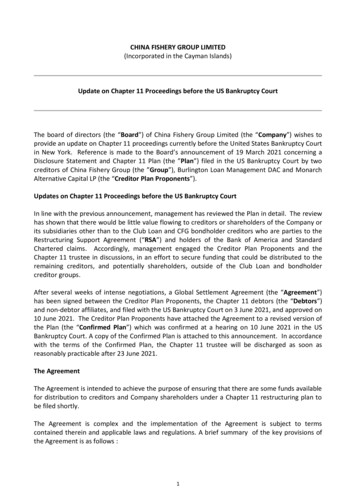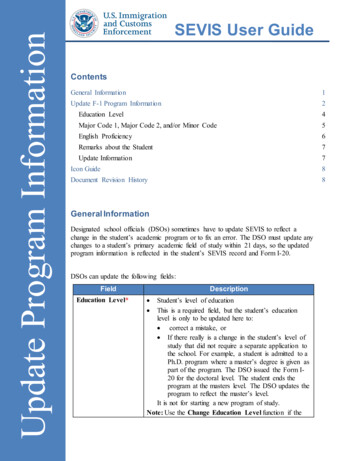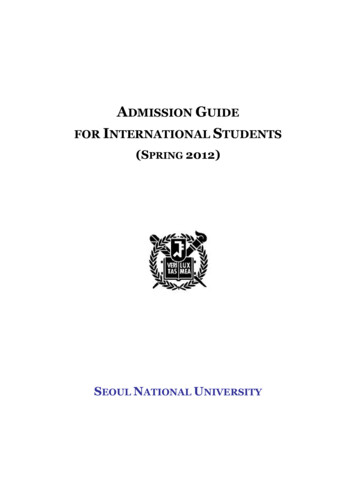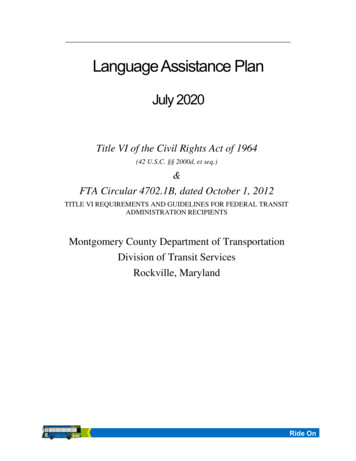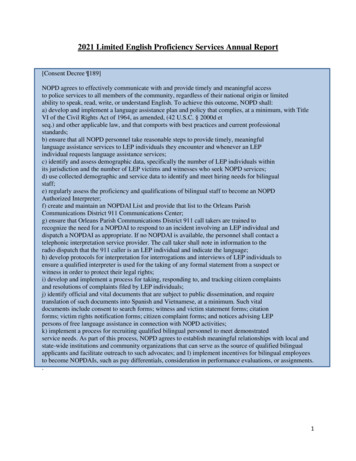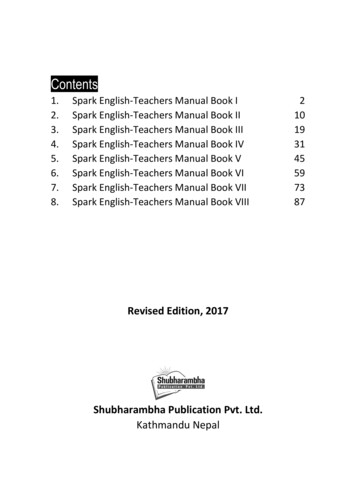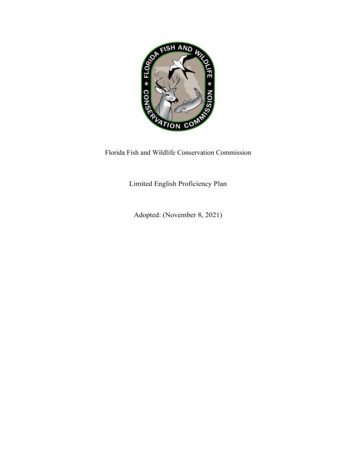
Transcription
Florida Fish and Wildlife Conservation CommissionLimited English Proficiency PlanAdopted: (November 8, 2021)
Table of ContentsI.Introduction . Page 3II.Meaningful Access: Four Factor Analysis . Page 4III. Language Assistance . Page 5IV. Staff Training . Page 6V.Translation of Documents. Page 6VI. Monitoring . Page 7VII. Dissemination of Florida Fish and Wildlife Conservation Commission (FWC)LEP Plan . Page 8VIII. Contact Information . Page 8
I. INTRODUCTIONThis Limited English Proficiency Plan has been prepared to address the Florida Fish & WildlifeConservation Commission’s (FWC) responsibilities as a recipient of federal financial assistanceas they relate to the needs of individuals with limited English language skills. The plan has beenprepared in accordance with Title VI of the Civil Rights Act of 1964, 42 U.S.C. 2000d, et seq,and its implementing regulations, which state that no person shall be subjected to discriminationon the basis of race, color or national origin. The FWC is committed to providing meaningfulaccess and will provide written translation for any of its documents, when reasonable, effectiveand within the available resources. In other cases, the FWC will strive to provide alternative butmeaningful accessibility. Moreover, the FWC continually evaluates its programs, services andactivities to ensure that persons who may be LEP are always provided with meaningful access.Federal guidance for recipients on Title VI of the Civil Rights Act indicates that differingtreatment based upon a person's inability to speak, read, write or understand English is a type ofnational origin discrimination (e.g.,Guidance to Federal Financial Assistance RecipientsRegarding Title VI Prohibition Against National Origin Discrimination Affecting LimitedEnglish Proficient Persons (February 18, 2011, df/2011-9336.pdf) Title VI applies to all state and local agencies which receive federalfunds.Key Termsa) Limited English Proficient Persons: Persons who do not speak English as their primarylanguage and who have a limited ability to read, speak, write, or understand English.b) Bilingual Persons: Persons who are bilingual are fluent in two languages and are able toconduct the business of the workplace in either of those languages. This is to be distinguishedfrom proficiency in more than one language. An individual who is proficient in a language may,for example, be able to greet an LEP individual in his or her language, but not conduct agencybusiness in that language. Interpretation and translation require the interpreter to be fluentlybilingual, and also require additional specific skills as described below in (c).c) Interpretation and translation: Interpretation involves oral communication. Translationinvolves written communication. Interpretation involves the immediate communication ofmeaning from one language into another. An interpreter conveys meaning orally, as a result,interpretation requires skills different from those needed for translation. Interpreting is acomplex task that combines several abilities beyond language competence in order to enabledelivery of an effective professional interpretation in a given setting. From the standpoint of theuser, a successful interpretation is one that faithfully and accurately conveys the meaning of thesource language orally, reflecting the style, register, and cultural context of the source message,without omissions, additions, or embellishments on the part of the interpreter. Interpreters maybe physically present, or, in appropriate circumstances, may appear via videoconferencing ortelephonically. When videoconferencing or telephonic interpretation are used, options includeconnecting directly to a specific professional interpreter with known qualifications or using acompany that provides telephonic interpretation services and has in place quality control andprivacy safeguards.If bilingual staff is asked to interpret or translate, staff should be qualified to do so.
Plan SummaryThe FWC has developed this Limited English Proficiency Plan to help identify reasonablesteps for providing language assistance to persons with Limited English Proficiency (LEP)who wish to access services provided. LEP persons are those who do not speak English astheir primary language and have limited ability to read, speak, write, or understand English.This plan outlines how to identify a person who may need language assistance, the ways inwhich assistance may be provided, staff training that may be required, and how to notify LEPpersons that assistance is available. In order to prepare this plan, the FWC used the four-factorLEP analysis which considers the following factors:1. The number or proportion of LEP persons in the service area who may be served by theFWC.2. The frequency with which LEP persons come in contact with FWC services.3. The nature and importance of services provided by the FWC to the LEP population.4. The interpretation services available to the FWC and overall cost to provide LEPassistance. A summary of the results of the four-factor analysis is in the followingsection.II. FOUR-FACTOR ANALYSIS1.The number or proportion of LEP persons in the service area who may beserved or are likely to require FWC services.The FWC staff reviewed the U.S. Census Report and determined that 7.9 million persons inFlorida, 30.5% of the population speak a language other than English. Of those 7.9 millionpersons, 563,224 have limited English proficiency; that is, they speak English "not well" or"not at all", this is only a 7.1 % of the overall population in Florida. In Florida, of thosepersons with limited English proficiency, 25.8% speak Spanish, 16.2% speak Indo-Europeanlanguages and 22.1% speak Asian and Pacific Island languages and 11.8% speak otherlanguages.2.The frequency with which LEP persons come in contact with the FWCservices.The FWC staff reviewed the frequency with which office staff had contact with LEPpersons. This information was collected and provided by Linguistica International, Inc. andFWC staff. According to Linguistica, in 2020, the FWC had 117 requests for interpreters forour Division of Law Enforcement Regional Dispatch Centers (107 Spanish, 4 Vietnamese, 2Mandrin, 1 Korean, 1 Bengali, 1 Russian and 1 Haitian Creole). FWC staff estimatedreceiving approximately 1000 requests for phone call interpreter assistance andapproximately 25 requests for FWC program assistance from LEP individuals. The largestconcentration of LEP requests were Spanish.3.The nature and importance of services provided by the FWC to the LEPpopulation.In terms of importance, the FWC provides services and programs to all residents and nonresidents, including LEP individuals seeking information on fish and wildlife activities in theState of Florida. These services may include habitat and species conservation, hunting, fishing,licensing, permitting, boating, wildlife and law enforcement. All of FWC’ s programs areimportant; however, those related to law enforcement, environment, hunting, fishing and
wildlife resources, are among the most important.4. The resources available to the FWC to provide LEP assistance.The FWC understands that it is a large entity serving a potentially large number of Spanishspeaking individuals. The FWC makes every effort to make its programs, services and activitiesaccessible to LEP individuals. In addition to documents that are routinely published in the mostfrequently encountered languages, the FWC will use available resources, both internal andexternal (e.g. Linguistica International, and agency staff), to accommodate reasonable requestsfor translation. Further, through the use of the 7-1-1- Relay Service, free oral interpretationservices are available.III.LANGUAGE ASSISTANCEA person who does not speak English as their primary language and who has alimited ability to read, write, speak or understand English may be a Limited EnglishProficient person and may be entitled to language assistance with respect to FWCservices. Language assistance can include interpretation, which means oral orspoken transfer of a message from one language into another language and/ortranslation, which means the written transfer of a message from one language intoanother language.Although the higher percentage of LEP individuals reside in the southern regions within thestate, FWC currently offers the following language assistance measures:1. The FWC staff will take reasonable steps to provide the opportunity for meaningfulaccess to LEP individuals who have difficulty in communicating English.2. The following resources will be available to accommodate LEP persons: FWC will continue to provide written materials translated in Spanish onpopular topics like boating, boating safety, birdwatching, living withGopher Tortoises and translation of landowner consent notices andletters, at an approximate cost of 14,000 annually. Language interpretation may be also accessed through a telephoneinterpretation service provided by the State of Florida, called FloridaRelay 7-1-1 (www.ftri.org/relay). A contact list of FWC bilingual staff will be made available on the FWCwebsite.The Division of Law Enforcement Regional Communication Dispatch Centers will continue toallocate 1200 annually for Linguistica International, Inc services., which providesinterpretation and translation services.Identifying an LEP person who needs language assistance:Step 1. Determine if the individual is limited English proficient (LEP) LEP person self-identifies as LEP; and/or LEP person requests an interpreter; and/ or
During the interaction, FWC staff believes that the individual does notspeak and understand English well enough to effectively participate inthe conversation/interview or fully understand questions and answerthem without difficulty.Step 2. Determine the language spoken by the LEP person. LEP person self identifies language preference; LEP person’s companion or an available document indicateslanguage preference; and/or LEP person identifies language preference through languageidentification tool.Step 3. Determine most efficient method to assist LEP person. Utilize internal bilingual staff to assist; and/or Utilize services through Florida 7-1-1 Relay; and/or Utilize contracted services through Linguistica International.Notifying LEP persons that language assistance is available:Post notice of LEP Plan and the availability of interpretation or translation services free ofcharge in languages LEP persons would understand on the FWC website. The website noticeof available LEP assistance will include information on Language Assistance availablethrough Florida 7-1-1 Relay services. Florida Relay is a service provided to residents in theState of Florida who are Deaf, Hard of Hearing, Deaf/Blind, or Speech Disabled that connectsthem to standard (voice) telephone users. Calls can be made 24/7, 365 days a year allowingour Florida residents who are in need of Relay services to connect and communicate withanyone at any time.PhoneServiceService DescriptionNumberTTY800-955-8771 If you are using TTY equipment.If you are a standard (voice) user and are trying to connectVoice800-955-8770with a Relay user.ASCII800-955-1339 If you are utilizing a computer.If you prefer to speak directly to the hearing person. When theVoice Carryhearing person speaks to you, the Relay Operator serves as877-955-8260Over (VCO)your "ears" and types everything said to your TTY or VCOphone.If you have a speech disability and would prefer to have ourSpeech to877-955-5334 specially trained Relay Operators serve as your voice andSpeech (STS)repeat your responses to the called party.Video-Assisted STS supports a one-way video call betweenVideo Assistedthe CA and STS user. The video connection assists the CA in877-955-5334STSunderstanding the STS user's speech. Callers can enter contactinformation in the STS Profile to reduce set-up time.Spanish to877-955-8773 If you prefer to conduct your conversations in Spanish.Spanish
ServiceSpanish toEnglishTranslationFrench toFrenchIV.PhoneNumberService DescriptionIf your primary language is Spanish, however your caller is an844-463-9710 English speaker. Our Relay Operators are able to translate yourconversation into English.If you prefer to conduct your conversation using the French877-955-8707 languageSTAFF TRAININGThe following training will be provided to FWC staff:V. Information on the Title VI Policy and LEP responsibilities; annuallyand upon hire. Description of language assistance services offered to the public; inperson and telephoneTRANSLATION OF DOCUMENTS VI.Requests for translation services from LEP individuals have received assistancefrom FWC staffing. The FWC will continue to monitor the requests to determineif translations of additional materials, and translations in languages other thanSpanish may be necessary in the future.MONITORINGMonitoring and Updating the LEP Plan- the FWC will review and update the LEP Planperiodically. At a minimum, the plan will be reviewed and updated when new data from the U.S.Census American Community Survey is available; or when it is identified a higher concentrationof LEP individuals are present in the FWC service area. Updates will include: Determination of the current LEP population in the service area. Track encounters with LEP individuals to identify current and future needs forlanguage services. How the needs of LEP persons have been addressed. Determination as to whether the need for translation services has changed. Determine whether local language assistance programs have been effective andsufficient to meet the need. Determine whether the FWC’s financial resources are sufficient to fund additionallanguage assistance resources needed. Determine whether the FWC fully complies with the goals of this LEP Plan.
FWC staff will be informally surveyed periodically on their experience andfrequency concerning any contacts with LEP persons during the previous year.VII. DISSEMINATION OF FWC LEP PLANPost information on the agency website notifying LEP persons of the LEP Plan and how toaccess language services.VIII. CONTACT INFORMATIONTo file a complaint with FWC, a member of the public may download the FWCdiscrimination complaint form and return to: Florida Fish and Wildlife ConservationCommission EEO/AA/ADA Coordinator, Paul Clemons, Office of Human Resources 620South Meridian Street Tallahassee, Florida 32399-1600.Your complaint will be carefully reviewed, and a determination made regarding the need foran investigation. The agency will make every effort to resolve the complaint within 45 daysof receipt. You will be periodically notified of the status of your complaint. You may alsocontact the Office of Inspector General (at 850-488-6068) or the Commission’sEEO/AA/ADA Coordinator (at 850-488-6411) at any time for information regarding thestatus of the complaint.
persons with limited English proficiency, 25.8% speak Spanish, 16.2% speak Indo-European languages and 22.1% speak Asian and Pacific Island languages and 11.8% speak other languages. 2. The frequency with which LEP persons come in contact with the FWC services. The FWC staff reviewed the frequency with which office staff had contact with LEP .
